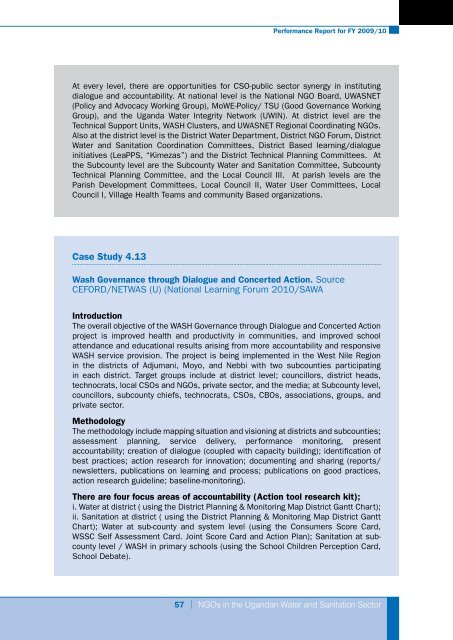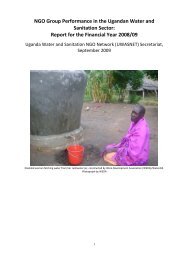Performance Report for FY 2009/10 - UWASNET
Performance Report for FY 2009/10 - UWASNET
Performance Report for FY 2009/10 - UWASNET
You also want an ePaper? Increase the reach of your titles
YUMPU automatically turns print PDFs into web optimized ePapers that Google loves.
<strong>Per<strong>for</strong>mance</strong> <strong>Report</strong> <strong>for</strong> <strong>FY</strong> <strong>2009</strong>/<strong>10</strong><br />
At every level, there are opportunities <strong>for</strong> CSO-public sector synergy in instituting<br />
dialogue and accountability. At national level is the National NGO Board, <strong>UWASNET</strong><br />
(Policy and Advocacy Working Group), MoWE-Policy/ TSU (Good Governance Working<br />
Group), and the Uganda Water Integrity Network (UWIN). At district level are the<br />
Technical Support Units, WASH Clusters, and <strong>UWASNET</strong> Regional Coordinating NGOs.<br />
Also at the district level is the District Water Department, District NGO Forum, District<br />
Water and Sanitation Coordination Committees, District Based learning/dialogue<br />
initiatives (LeaPPS, “Kimezas”) and the District Technical Planning Committees. At<br />
the Subcounty level are the Subcounty Water and Sanitation Committee, Subcounty<br />
Technical Planning Committee, and the Local Council III. At parish levels are the<br />
Parish Development Committees, Local Council II, Water User Committees, Local<br />
Council I, Village Health Teams and community Based organizations.<br />
Case Study 4.13<br />
Wash Governance through Dialogue and Concerted Action. Source<br />
CEFORD/NETWAS (U) (National Learning Forum 20<strong>10</strong>/SAWA<br />
Introduction<br />
The overall objective of the WASH Governance through Dialogue and Concerted Action<br />
project is improved health and productivity in communities, and improved school<br />
attendance and educational results arising from more accountability and responsive<br />
WASH service provision. The project is being implemented in the West Nile Region<br />
in the districts of Adjumani, Moyo, and Nebbi with two subcounties participating<br />
in each district. Target groups include at district level; councillors, district heads,<br />
technocrats, local CSOs and NGOs, private sector, and the media; at Subcounty level,<br />
councillors, subcounty chiefs, technocrats, CSOs, CBOs, associations, groups, and<br />
private sector.<br />
Methodology<br />
The methodology include mapping situation and visioning at districts and subcounties;<br />
assessment planning, service delivery, per<strong>for</strong>mance monitoring, present<br />
accountability; creation of dialogue (coupled with capacity building); identification of<br />
best practices; action research <strong>for</strong> innovation; documenting and sharing (reports/<br />
newsletters, publications on learning and process; publications on good practices,<br />
action research guideline; baseline-monitoring).<br />
There are four focus areas of accountability (Action tool research kit);<br />
i. Water at district ( using the District Planning & Monitoring Map District Gantt Chart);<br />
ii. Sanitation at district ( using the District Planning & Monitoring Map District Gantt<br />
Chart); Water at sub-county and system level (using the Consumers Score Card,<br />
WSSC Self Assessment Card. Joint Score Card and Action Plan); Sanitation at subcounty<br />
level / WASH in primary schools (using the School Children Perception Card,<br />
School Debate).<br />
57 | NGOs in the Ugandan Water and Sanitation Sector



